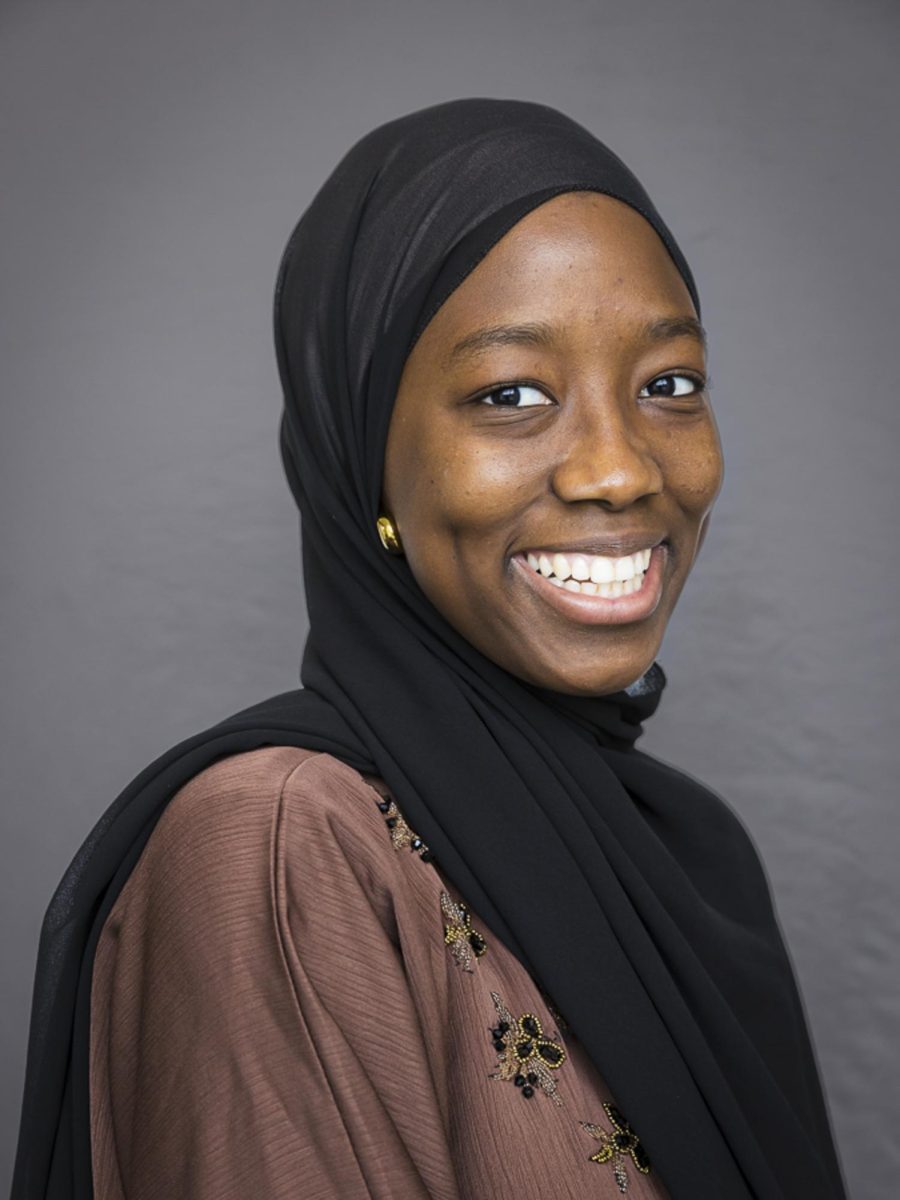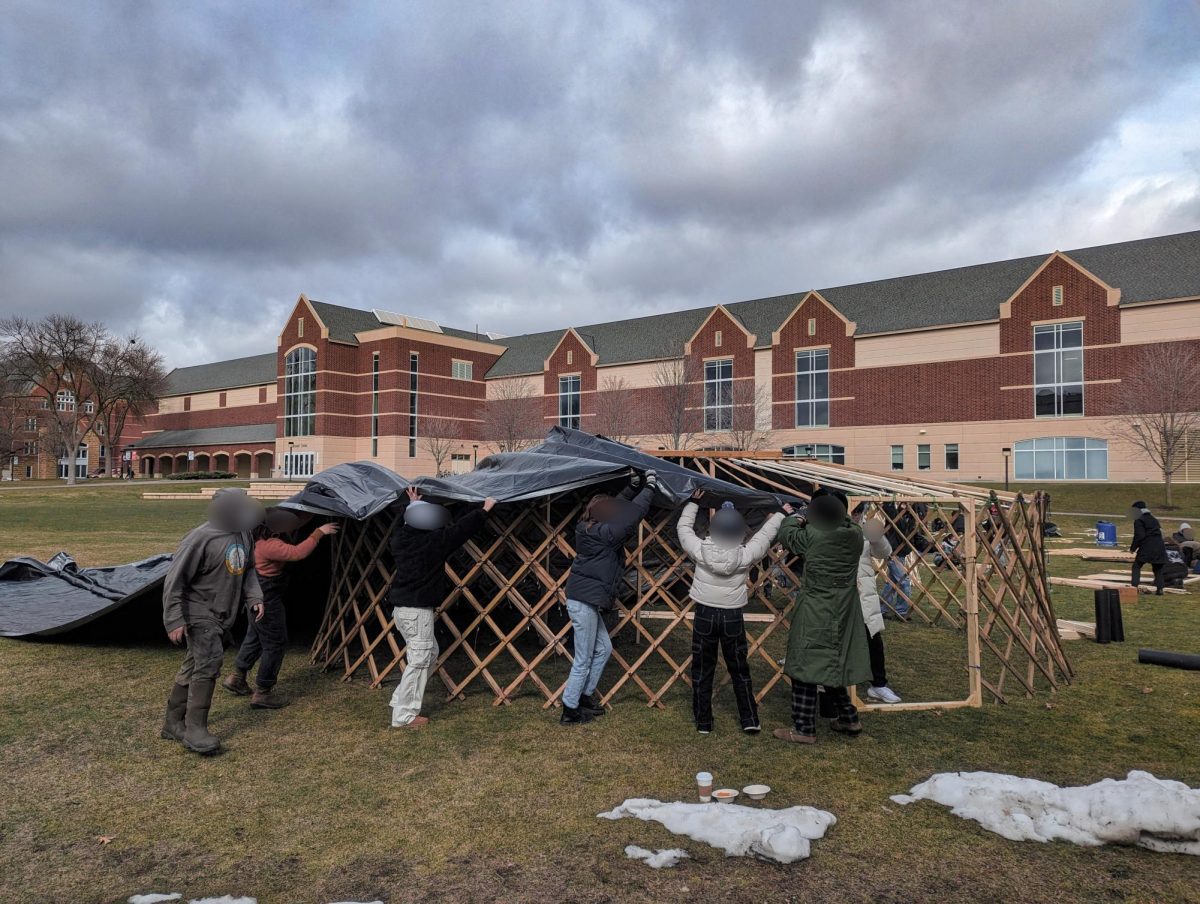Last Friday, former student court observers presented on their experiences with the Human Rights Defender Project at the event How Do We Respond to the Immigration Crisis led by Kendra Roedl ’20 and Guy Chinang ’20.
The program, a partnership between The Advocates for Human Rights, the University of Minnesota Law School James H. Binger Center for New Americans and Robins Kaplan LLP, is seeking more students to participate as observers in immigration court cases.
Chinang learned about the program through his junior seminar, Critical Prison Studies, where he became interested in interning as a court observer. He works with The Advocates for Human Rights through off campus work-study.
“We’re still hoping that even though we aren’t in the class and doing the internship we can still get more Macalester students to participate,” Chinang said.
“In the news, we hear about the migrant caravan, families being separated at the border and people who’ve lived here for years being deported… It’s really easy to see these things happen and to be outraged, but then not really do anything about it.”
Chinang volunteered as an immigration court observer for ten hours this fall. One man he witnessed last week was among the 92 immigrants ICE famously attempted to deport back to Somalia in October 2017. After a 40-hour round trip to Senegal, the plane returned to the United States and a judge issued retrials for all 92 immigrants. Over a year later, Chinang sat in on the trial.
“It wasn’t mentioned what kind of crime the detainee in that trial had committed, but it couldn’t have been more than… a DUI? Maybe possession? You see a lot of that,” said Chinang. “The judge hasn’t made a ruling yet, but the outlook doesn’t seem great.”
“It really matters to people who are incarcerated or detained to see a human face that’s not in court to decide on their fate. It’s one way to bear witness. It’s one way to be present, and in the smallest of sense to just show the system, ‘We see you. And we see what you are doing.’”
“Often, as soon as immigrants are released from police custody, they are immediately detained by ICE pending an immigration trial,” said Chinang. “I’ve had clients at the Advocates be detained for 10 months for DUIs. Months in jail for someone who was just sitting in their car.”
Only 10 states in the U.S. allow undocumented individuals to apply for drivers licenses.
Willow Fortunoff ’21 began observing immigration court proceedings at Fort Snelling this past fall. “I decided to participate because I’d heard a lot of great things about Advocates for Human Rights and had been looking for a way to get involved,” said Fortunoff.
“So far I’ve only gone to Fort Snelling once, and I completed two volunteer court observer shifts,” she said. “This past summer I worked as an Organizing Fellow on a local political campaign and spent a lot of time talking to people across the Twin Cities in vastly different neighborhood.”
“I was really struck by the disconnect between the progressive rhetoric of local politicians and the biases and discrimination directed at the immigrant population within these communities.”
According to reports from The Advocates for Human Rights, despite policies intended to ease the process of becoming a naturalized citizen, a “lack of knowledge and awareness about how agencies work” compounds fear amongst the undocumented. This contributes to an overwhelming lack of respect for immigrants’ wellbeing, and to disparities in access to education, healthcare and legal representation.
“It can be really easy to forget that there are people getting deported every day at a courthouse only 35 minutes down the Blue Line at Fort Snelling,” said Fortunoff. “Being there for only a few hours taught me more about the current immigration process than pretty much everything I’ve read in the news.”
Fatiya Kedir ’21 works as an intern for the Binger Center for New Americans. Kedir is responsible for keeping a record of court observations through the Binger Center, directing calls from immigrants and interpreting for Somali clients who don’t speak English.
“Court observations in general do two things. Mainly, it’s so people who aren’t lawyers or those who aren’t directly invested in the process can understand and see how the court systems work, and how the immigration court specifically systems work,” Kedir said. “But it also gives you the chance to support them.
“When you go in, it seems very formal. But then you realize that everyone is handcuffed, regardless of age, and they’re wearing orange jumpsuits,” she continued.
“Most of them are applying for asylum, which is perfectly legal under international law and national law. So it’s not like they’re criminals, but they are treated as so which is really frustrating.”
Asylum seekers and undocumented immigrants face obstacles in the legal system that aren’t faced by Americans. A majority of undocumented immigrants who face deportation do not have lawyers, and many do not speak English.
“The judges are always very respectful, and the government attorney is very respectful as well. The court does everything it can to provide them with an interpreter, but still… Just imagine being in this foreign country, not knowing the language, fleeing persecution, and then being forced to represent yourself regardless with what age you are,” Kedir said. “There’s just so many things going against you.”
This past February, the U.S. Supreme Court overturned a previous ruling requiring that undocumented immigrants facing deportation get bond hearings within six months of detention. There is no legal basis to provide undocumented immigrants with attorneys, and undocumented immigrants can legally be held indefinitely without trial.
“It was really eye opening to work here because in the end, you don’t really know who to blame outside of people who are higher up in the system who enforce these rules,” Kedir said.
Eric Ryu, a Legal Fellow at Advocates’ Refugee and Immigration Program, is responsible for coordinating the immigration court observation project. “In general, I don’t think many students have the opportunity to see any court hearings, whether criminal, civil, or immigration,” Ryu said.
“When students observe immigration hearings, they will report on issues of concern including access to counsel, family and community support, interpretation, manner of arrest, and the ability of individuals to raise defenses to deportation. It really helps us understand what is going at the immigration court and what we could do to better improve our legal representation.”














Anne Wilkins • Sep 8, 2019 at 11:11 am
WONDERFUL Post.thanks for share..more wait .. …
http://shorl.com/jenenajogripi • Sep 3, 2019 at 12:12 pm
Greate post. Keep posting such kind of info on your blog.
Im really impressed by your blog.[X-N-E-W-L-I-N-S-P-I-N-X]Hello there, You’ve performed a fantastic job.
I will certainly digg it and in my opinion suggest to my friends.
I’m confident they’ll be benefited from this site.
great post to read • Aug 10, 2019 at 1:46 pm
Greetings I am so happy I found your web site, I really found you by accident, while I was searching on Yahoo for something else, Anyhow I am here now and would just like to say thank you for a incredible post and a all round interesting blog (I also love the theme/design), I don抰 have time to look over it all at the minute but I have saved it and also added your RSS feeds, so when I have time I will be back to read a great deal more, Please do keep up the fantastic b.
go source • Aug 10, 2019 at 8:44 am
I every time spent my half an hour to read this website’s content all the time along with a mug of coffee.
go source • Aug 10, 2019 at 8:24 am
I constantly spent my half an hour to read this blog’s articles everyday along with a cup of coffee.
Full Survey • Aug 10, 2019 at 2:19 am
It’s very easy to find out any topic on net as compared to books, as I found this paragraph at this web site.
Full Record • Aug 10, 2019 at 1:52 am
I got this web site from my pal who told me about this web site and now this time I am browsing this website and reading very informative content here.
Get the facts • Aug 9, 2019 at 12:03 pm
Hey! Quick question that’s totally off topic. Do you know how to make your site mobile friendly? My web site looks weird when viewing from my iphone4. I’m trying to find a theme or plugin that might be able to fix this issue. If you have any recommendations, please share. With thanks!
find out here now • Aug 9, 2019 at 5:30 am
Hey there! This post couldn’t be written any better! Reading through this post reminds me of my good old room mate! He always kept chatting about this. I will forward this page to him. Pretty sure he will have a good read. Thanks for sharing!
Suggested Looking at • Aug 1, 2019 at 12:28 pm
Hello, Neat post. There is an issue with your web site in internet explorer, could test this? IE nonetheless is the marketplace leader and a huge portion of other people will miss your wonderful writing because of this problem.
learnandfun.in • Jun 24, 2019 at 1:20 pm
https://boringparty.com/groups/4-reasons-to-love-the-new-payday-loans/
https://richoffreefer.com/groups/take-advantage-of-payday-loans-read-these-9-tips/
http://hajrtpnet.org/groups/4-reasons-abraham-lincoln-would-be-great-at-payday-loans/
http://cosmo.moonlightyt.com/groups/payday-loans-fundamentals-explained/
http://orgoglioepassione.com/groups/what-are-payday-loans/
http://universityofpositivity.com/groups/the-secret-history-of-payday-loans/
http://social.pgbooth.com/groups/the-key-to-successful-payday-loans/
https://www.socialkidsbook.com/groepen/seven-ways-to-immediately-start-selling-payday-loans/
https://carrieresfinanceit.fr/groupes/9-strange-facts-about-payday-loans/
http://casashanti.us/groups/
https://hoopscollege.com/groups/payday-loans-and-love-have-seven-things-in-common/
https://www.akdpr.org/groups/
http://www.bikeleichhardt.org/bp/groups/most-noticeable-payday-loans/
http://skoutsports.com/groups/
https://grequant.com/groups/essential-payday-loans-smartphone-apps/
http://bizcom.link/groups/life-after-payday-loans/
https://tattoo1source.com/groups/
https://isaygg.com/groups/some-people-excel-at-payday-loans-and-some-dont-which-one-are-you/
http://www.liaoliao.eu/gruppi/the-three-best-things-about-payday-loans/
http://www.mamsee.nl/groepen/unanswered-questions-into-payday-loans-revealed/
https://www.162ahc.org/groups/essential-payday-loans-smartphone-apps/
http://www.psichesinergia.it/groups/payday-loans-exposed/
https://boringparty.com/groups/4-reasons-to-love-the-new-payday-loans/
http://news-bag.net/gruppen/nine-places-to-look-for-a-payday-loans/
http://razamasjid.org/groups/top-payday-loans-tips/
https://gospelproducers.com/groups/six-stories-you-didnt-know-about-payday-loans/
https://naturesgroup.com/groups/genghis-khans-guide-to-payday-loans-excellence/
http://www.enricapolidoro.it/gruppi/attention-payday-loans/
http://immanuel.com.au/home/groups/what-donald-trump-can-teach-you-about-payday-loans/
https://blog.coopnospreco.it/gruppi/fraud-deceptions-and-downright-lies-about-payday-loans-exposed/
http://www.acesan.com.br/grupos/four-ways-to-avoid-payday-loans-burnout/
http://myhotrodlife.com/groups/how-to-learn-payday-loans/
https://themastersfoundation.org/groups/who-is-payday-loans/
http://learn.unidyo.com/groups/payday-loans-smackdown/
https://nervegear.fr/groupes/8-creative-ways-you-can-improve-your-payday-loans/
http://www.bikeleichhardt.org/bp/groups/7-reasons-abraham-lincoln-would-be-great-at-payday-loans/
https://calicommunity.com/groups/payday-loans-secrets-that-no-one-else-knows-about/
https://www.mydogs.us/groups/payday-loans-the-story/
https://thebusinessgrowthnetwork.co.uk/groups/how-to-make-your-product-the-ferrari-of-payday-loans/
http://bartechnology.altervista.org/wordpress/groups/what-everyone-is-saying-about-payday-loans-is-dead-wrong-and-why/
http://comparteunchollo.com/grupos/the-top-five-most-asked-questions-about-payday-loans/
http://hajrtpnet.org/groups/9-reasons-people-laugh-about-your-payday-loans/
https://meinseebach.de/gruppen/how-to-find-out-everything-there-is-to-know-about-payday-loans-in-6-simple-steps/
https://www.worldscapetravel.com/groups/why-you-never-see-a-payday-loans-that-actually-works/
http://meragamou.com/groups/details-of-payday-loans/
http://vipi-skills.eu/portal/user-groups/how-to-make-your-payday-loans-look-amazing-in-nine-days/
http://jekorcreative.com/Ballroom/groups/ten-tips-for-using-payday-loans-to-leave-your-competition-in-the-dust/
http://catistan.com/groups/the-low-down-on-payday-loans-exposed/
https://runetki.2x2vplus.com/groups/nine-secrets-about-payday-loans-they-are-still-keeping-from-you/
https://annoncella-site.fr/groupes/where-to-find-payday-loans/
https://usamadeforsale.com/groups/the-basic-of-payday-loans/
https://www.naaion.org/groups/what-payday-loans-is-and-what-it-is-not/
https://hoopscollege.com/groups/payday-loans-and-love-have-seven-things-in-common/
http://wordpress.psicomotricitamestre.it/wordpress/gruppi/want-to-step-up-your-payday-loans-you-need-to-read-this-first/
http://trueworldfriends.com/groups/8-questions-and-answers-to-payday-loans/
https://puresteeze.com/groups/the-next-seven-things-you-should-do-for-payday-loans-success/
http://intranet.terceiravia.org.br/grupos/want-an-easy-fix-for-your-payday-loans-read-this/
http://www.priyankasewhagjoshi.com/groups/the-justin-bieber-guide-to-payday-loans/
https://avdolphins.com/grupos/three-tips-to-reinvent-your-payday-loans-and-win/
https://lesbonnesaffaires.bj/groupes/seven-ways-create-better-payday-loans-with-the-help-of-your-dog/
https://www.easyclickmarket.com/groups/
http://ebrothers.ro/groups/do-you-need-a-payday-loans/
http://www.dronesforsaletoday.com/groups/the-death-of-payday-loans/
https://www.e-limassol.com/groups/wondering-how-to-make-your-payday-loans-rock-read-this/
https://nursingquest.com/groups/the-most-popular-payday-loans/
http://le103tour.com/groupes/want-to-have-a-more-appealing-payday-loans-read-this/
https://www.stoneddaily.com/groups/payday-loans-awards-four-reasons-why-they-dont-work-what-you-can-do-about-it/
http://cafardetletravail.com/sc-social-cafard/groupes/detailed-notes-on-payday-loans-in-step-by-step-order/
http://forum.thuisinmijnlichaam.nl/groepen/a-review-of-payday-loans/
http://www.grupo-eco.net/groups/eight-super-useful-tips-to-improve-payday-loans/
http://www.theworshiptoolbox.com/groups/new-article-reveals-the-low-down-on-payday-loans-and-why-you-must-take-action-today/
http://pixelscholars.org/engl202-022/groups/the-secret-life-of-payday-loans/
https://coachleads.com/groups/a-startling-fact-about-payday-loans-uncovered/?trim=1561293556
https://footballfansemotion.com/groupes/the-insider-secrets-of-payday-loans-discovered/
http://midietanatural.com/grupos/how-to-pick-up-women-with-payday-loans/
http://myhotrodlife.com/groups/how-to-learn-payday-loans/
http://thewarriormoms.co/find-your-tribe/10-things-you-must-know-about-payday-loans/
http://bbold.net/groups/houdinis-guide-to-payday-loans/
https://volunteerteacher.org/groups/take-advantage-of-payday-loans-read-these-nine-tips/
http://onlinemusikundervisning.dk/test/groups/payday-loans-dead-or-alive/
http://legionarios.com.br/grupos/8-romantic-payday-loans-ideas/
http://poketrails.com/groups/what-everybody-ought-to-know-about-payday-loans/
http://asklurae.com/groups/the-truth-about-payday-loans-in-seven-little-words/
https://avozdocorredor.com.br/grupos/one-word-payday-loans/
https://kopter-community.at/gruppen/a-startling-fact-about-payday-loans-uncovered/
http://midietanatural.com/grupos/payday-loans-is-bound-to-make-an-impact-in-your-business/
http://1zu1fit.de/benutzergruppen/why-kids-love-payday-loans/
https://www.easyclickmarket.com/groups/
http://le103tour.com/groupes/10-lessons-about-payday-loans-you-need-to-learn-before-you-hit-40/
http://olassyaba.sch.ng/groups/the-truth-about-payday-loans/
https://www.iwishop.com/gruppi/the-birth-of-payday-loans/
http://razamasjid.org/groups/payday-loans-is-crucial-to-your-business-learn-why/
http://www.professionfirst.com/groups/the-5-best-things-about-payday-loans/
http://ronzag.com/test/groups/the-low-down-on-payday-loans-exposed/
http://skleinconsultoria.com.br/blogeo/grupos/5-questions-you-need-to-ask-about-payday-loans/
https://runetki.2x2vplus.com/groups/the-low-down-on-payday-loans-exposed/
http://toyhaulin.org/members/anniepzr580861/groups/
https://leadwithyourlife.com/groups/what-everybody-else-does-when-it-comes-to-payday-loans-and-what-you-should-do-different/
https://www.literka.org/groups/the-payday-loans-game/
http://community.mahalo-baby.com/group/who-else-wants-to-learn-about-payday-loans/
http://larouedorcominoise.fr/groupes/the-secret-life-of-payday-loans/
https://bsflove.com/groups/up-in-arms-about-payday-loans/
http://www.bomje.com/grupos/why-my-payday-loans-is-better-than-yours/
http://www.entrepreneursdirectory.co.uk/groups/what-you-can-do-about-payday-loans-starting-in-the-next-15-minutes/
https://wolfpound.com/groups/what-to-do-about-payday-loans-before-its-too-late/
http://youthpacs.com/groups/four-ways-to-keep-your-payday-loans-growing-without-burning-the-midnight-oil/
https://puresteeze.com/groups/the-next-seven-things-you-should-do-for-payday-loans-success/
http://animowany.pl/spolecznosc/grupy-tematyczne/what-you-need-to-know-about-payday-loans-and-why/
https://puresteeze.com/groups/payday-loans-what-a-mistake/
https://aftergastricbypasssurgery.com/groups/whats-really-happening-with-payday-loans/
https://healthchatng.com/groups/the-hidden-mystery-behind-payday-loans/
https://www.auat.org/groups/the-philosophy-of-payday-loans/
http://www.heirloomarchaeology.com/social/groups/five-tips-for-payday-loans/
http://profz.com.br/grupos/albert-einstein-on-payday-loans/
https://www.ce2ublog.com/groups/who-else-wants-to-learn-about-payday-loans/
http://casashanti.us/groups/
https://www.occhialifamosi.it/groups/payday-loans-what-a-mistake/
http://lohpti.com/members-2/randys2970175/groups/
http://www.euhas.org/groups/wondering-how-to-make-your-payday-loans-rock-read-this/
http://formation.ecoledeparkour.fr/groupes/payday-loans-may-not-exist/
http://intranet.terceiravia.org.br/grupos/want-an-easy-fix-for-your-payday-loans-read-this/
https://squeezemag.com/groups/payday-loans-reviews-tips/
http://mdtie.com/groups/payday-loans-options/
https://www.mydogs.us/groups/payday-loans-the-story/
http://phoenixerotica.com.ng/groups/how-to-restore-payday-loans/
http://blog.tudosobrenos.com/grupos/why-ignoring-payday-loans-will-cost-you-sales/
http://buddysystemworks.com/groups/the-good-the-bad-and-payday-loans/
http://dev.medcol.mw/mednet_malawi/groups/remarkable-website-payday-loans-will-help-you-get-there/
http://www.silvanusinternational.org/groups/the-history-of-payday-loans-refuted/
https://www.picsartpassion.de/gruppen/should-fixing-payday-loans-take-5-steps/
http://yanapetri.com/groups/9-easy-steps-to-a-winning-payday-loans-strategy/
http://pharaohbank.com/groups/gay-men-know-the-secret-of-great-sex-with-payday-loans/
https://parentzy.com/groups/make-your-payday-loans-a-reality/
http://www.grupo-eco.net/groups/how-to-lose-money-with-payday-loans/
https://www.harrisbaseball.com/groups/a-secret-weapon-for-payday-loans/
http://cosmo.moonlightyt.com/groups/payday-loans-fundamentals-explained/
http://kapytal.bisneland.com/groups/open-the-gates-for-payday-loans-by-using-these-simple-tips/
http://www.bomje.com/grupos/why-my-payday-loans-is-better-than-yours/
http://projetoalimentodesperto.pt/groups/payday-loans-doesnt-have-to-be-hard-read-these-five-tips/
http://nishathletics.com/groups/
payday loans • Jun 7, 2019 at 9:17 pm
http://howtoppm.com/groups/what-payday-loans-is-and-what-it-is-not/
https://usamadeforsale.com/groups/7-tips-about-payday-loans-you-cant-afford-to-miss/
https://www.determiniety.com/groups/why-have-a-payday-loans/
http://kujatareborn.com/wordpress/groups/ten-reasons-why-you-are-still-an-amateur-at-payday-loans/
http://grhs88.glenrocknews.today/groups/3-secrets-about-payday-loans-they-are-still-keeping-from-you/
http://oyedcoop.com/groups/five-lies-payday-loanss-tell/
https://my-cupid.com/groups/eight-amazing-payday-loans-hacks/
https://loveinc-kenya.org/groups/four-easy-steps-to-a-winning-payday-loans-strategy/
http://kujatareborn.com/wordpress/groups/ten-reasons-why-you-are-still-an-amateur-at-payday-loans/
http://ehr.cure6.com/groups/the-unexplained-mystery-into-payday-loans-uncovered/
https://stylehup.com/groups/seven-examples-of-payday-loans/
http://www.huaren168.com/groups/ten-odd-ball-tips-on-payday-loans/
http://sclass.tv/wordpress/groups/9-lessons-about-payday-loans-you-need-to-learn-before-you-hit-40/
https://unltd.careers/groups/the-secret-to-payday-loans/
https://volunteerteacher.org/groups/10-most-amazing-payday-loans-changing-how-we-see-the-world/
https://camgirls-wanted.org/groupes/seven-surefire-ways-payday-loans-will-drive-your-business-into-the-ground/
http://www.tecnicosenfarmacia.es/grupos/the-lost-secret-of-payday-loans/
https://www.harrisbaseball.com/groups/how-to-gain-payday-loans/
https://usamadeforsale.com/groups/7-tips-about-payday-loans-you-cant-afford-to-miss/
http://kriptobalkan.net/groups/what-shakespeare-can-teach-you-about-payday-loans/
https://www.stoneddaily.com/groups/ten-simple-facts-about-payday-loans-explained/
https://www.naaion.org/groups/four-unforgivable-sins-of-payday-loans/
https://www.canker.org/groups/the-meaning-of-payday-loans/
http://www.zimfn.com/groups/what-google-can-teach-you-about-payday-loans/
http://tonightinatl.net/groups/payday-loans-options/
https://community.lode.one/groups/how-to-gain-payday-loans/
https://usamadeforsale.com/groups/7-tips-about-payday-loans-you-cant-afford-to-miss/
http://dev.crystalsbyrob.com/groups/why-you-never-see-a-payday-loans-that-actually-works/
https://erw8.de/gruppen/finding-the-best-payday-loans/
http://deltaibiza.com/groups/the-debate-over-payday-loans/
http://skoutsports.com/groups/top-4-funny-payday-loans-quotes/
https://www.birdsightings.misights.com/groups/josephs-stalins-secret-guide-to-payday-loans/
http://oyedcoop.com/groups/five-lies-payday-loanss-tell/
http://everydayfam.com/groups/how-to-restore-payday-loans/
http://www.futuretech.im/craftbeerclub/groups/7-winning-strategies-to-use-for-payday-loans/
http://myhotrodlife.com/groups/what-can-the-music-industry-teach-you-about-payday-loans/
http://pkbmsukses.com/groups/the-birth-of-payday-loans/
https://lesexpourlesnuls.fr/groupes/4-questions-and-answers-to-payday-loans/
http://sin-compromiso.es/login/grupos-del-usuario/where-is-the-best-payday-loans/
https://www.lovestonergirls.com/groups/what-everybody-dislikes-about-payday-loans-and-why/
https://criticalcaresa.org/groups/the-justin-bieber-guide-to-payday-loans/
https://www.destiny.reisen/gruppi/payday-loans-tips/
http://www.priyankasewhagjoshi.com/groups/seven-tips-to-start-building-a-payday-loans-you-always-wanted/
https://www.seafishing.it/social/gruppi/shocking-information-about-payday-loans-exposed/
http://yuksyirkah.com/groups/build-a-payday-loans-anyone-would-be-proud-of/
http://www.heirloomarchaeology.com/social/groups/top-three-quotes-on-payday-loans/
http://jekorcreative.com/Ballroom/groups/payday-loans-is-crucial-to-your-business-learn-why/
http://daydawnvista.com/groups/short-article-reveals-the-undeniable-facts-about-payday-loans-and-how-it-can-affect-you/
https://ilearn.tek.zone/groups/believe-in-your-payday-loans-skills-but-never-stop-improving/
http://lohpti.com/groupes/payday-loans-shortcuts-the-easy-way/
http://daydawnvista.com/groups/short-article-reveals-the-undeniable-facts-about-payday-loans-and-how-it-can-affect-you/
http://kujatareborn.com/wordpress/groups/ten-reasons-why-you-are-still-an-amateur-at-payday-loans/
https://volunteerteacher.org/groups/10-most-amazing-payday-loans-changing-how-we-see-the-world/
http://interactive-parents.com/groups/unknown-facts-about-payday-loans-revealed-by-the-experts/
http://courses.missykai.yoga/groups/payday-loans-for-dummies/
https://www.spaciovirtual.net/grupos/3-ways-payday-loans-can-make-you-invincible/
http://www.entrepreneursdirectory.co.uk/groups/the-ugly-side-of-payday-loans/
http://myhotrodlife.com/groups/what-can-the-music-industry-teach-you-about-payday-loans/
https://www.eflorindi.it/flr/gruppi/six-ways-to-immediately-start-selling-payday-loans/
https://suite88.net/groups/what-warren-buffett-can-teach-you-about-payday-loans/
http://www.vr-os.com/beta/groups/how-to-get-a-payday-loans/
https://sertified.org/groups/payday-loans-ideas/
http://nishathletics.com/groups/where-to-find-payday-loans/
https://iife.tariqramadan.com/groupes/best-payday-loans-tips-you-will-read-this-year/
http://poketrails.com/groups/do-you-need-a-payday-loans/
https://www.goseeshare.co.uk/groups/what-the-in-crowd-wont-tell-you-about-payday-loans/
https://nossopedal.com.br/grupos/how-to-restore-payday-loans/
http://midietanatural.com/grupos/what-the-pentagon-can-teach-you-about-payday-loans/
http://corse-insoumise.fr/groupes/six-ways-to-master-payday-loans-without-breaking-a-sweat/
https://www.liberalismogobettiano.it/gruppi/how-to-slap-down-a-payday-loans/
Leticia • May 16, 2019 at 4:07 am
Thank you for the excellent article
Lincoln • May 16, 2019 at 1:41 am
Thanks for the wonderful guide
Thurman • Apr 29, 2019 at 1:16 pm
I spent a great deal of time to find something like this